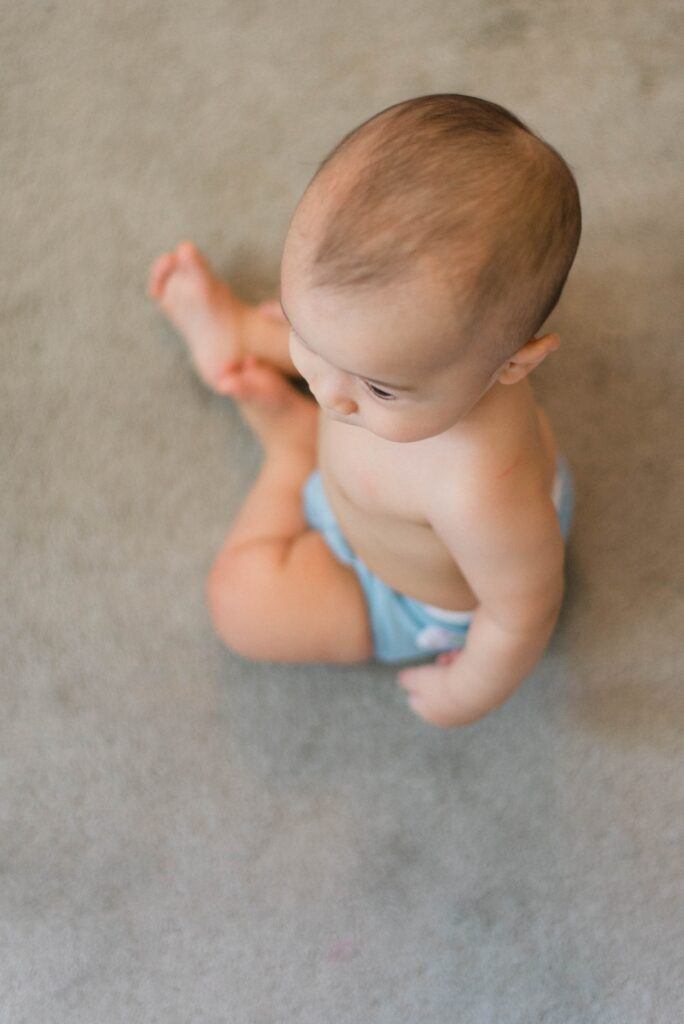The journey of your baby’s development may fill you with excitement, wonder, but sometimes also worry. We ask ourselves, am I doing enough to support my baby? What’s the range of normal for this milestone? What does it mean if my baby is “early” or “late”? Is there something I should be buying to help them grow and develop faster and stronger? I hope that this article, as well as every other I offer, helps to ease your mind and allow more space to enjoy the miracle unfolding before you. I’ll explore when babies typically start sitting up and delve into ways to support this achievement using respectful practices.
When Do Babies Start Sitting Up?
Babies vary in their developmental timelines, and the age at which they learn to sit can differ. On average, most babies begin to sit up between the ages of 4 to 7 months. However, it’s essential to remember that this is a general guideline, and some babies may achieve this milestone earlier or later without cause for concern. Always chat with your pediatrician if you have concerns.
Gentle and Respectful Practices to Help Your Baby Sit

The RIE approach, created by infant expert Magda Gerber, emphasizes respect, observation, and allowing infants to be active participants in their own development. Here are some principles and techniques from RIE (Resources for Infant Educarers) that can be applied to support your baby in learning to sit up:
- Use Respectful Observation
In a safe, engaging and uncluttered space where your baby can move and discover their body’s capabilities, you are free to observe their movement, and listen for cues that they need comfort or assistance. - Encourage Independent Movement w/Minimal Intervention
While it’s natural to want to help your baby sit up, it’s essential to refrain from propping them or showing them the way to move. As your baby experiments, makes mistakes and overcomes frustration, they have the opportunity to build strength and coordination, as well as perseverance, pride and self-determination. Rather than helping them learn to sit, we can focus our energy on supporting them emotionally as they develop. - Provide a Safe Environment
Designate a safe and comfortable area for your baby to roll, scoot, shift and practice sitting. A blanket, rug or a well-padded play mat will cushion potential falls and create security. - See Play as Learning
Offer your baby activities that naturally encourage sitting, such as reaching for objects above them, engaging with something attached to the wall. These activities not only make learning enjoyable but also promote motor development. - Respect Individual Pace
Your baby will develop at their own pace, with their own style. When that little part of your brain starts to compare your baby’s progress to others, stay grounded by appreciation the clever, entertaining tiny person in front of you. Before you know it, they’ll be up and running so enjoy this phase while it lasts! - Foster Trust and Communication
As you respond to your baby’s cues and signals for help, do so slowly and with curiosity. “Oh, you got stuck there. Would you like me to roll you backwards?” You can help them back to the position they were in previously and then see what happens. Maybe the need a hug, maybe they’ve tired out for the moment, or maybe they want to try again! Your baby will let you know, and by establishing trust through responsive caregiving, your baby will feel secure as they explore and develop new skills. - Celebrate the Smallest Victories
On your baby’s journey toward sitting independently, you can offer encouragement and celebrate small victories to help build their confidence. Without distracting them from their hard work, acknowledge their efforts, “you’ve been at this for a long time now!” “I see you trying again even after you fell.” “It must feel good to have finally gotten your leg there. You’ve been working at it!”

In Conclusion
By creating a supportive environment and allowing infants the freedom to explore movement on their terms, parents can play an essential role in nurturing their baby’s ability to sit up independently. When we embrace our baby’s unique journey of development with patience and respect, we foster a strong parent-child bond and their inner confidence, both of which will serve them (and you!) for years to come.
<3 Coach Nina
w: understandingmybaby.com
e: nina@understandingmybaby.com

